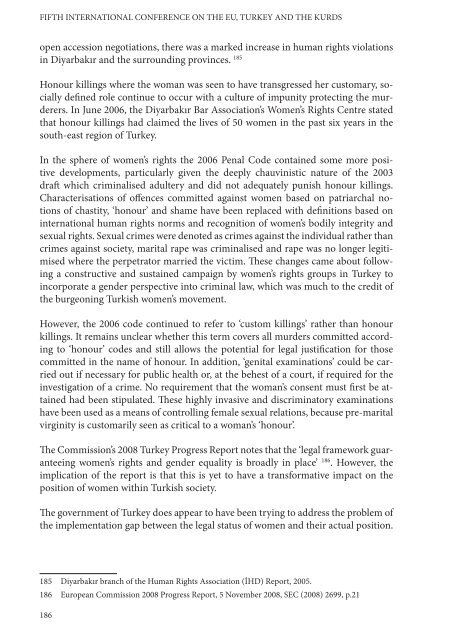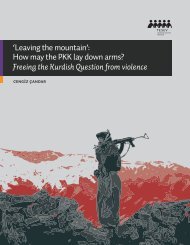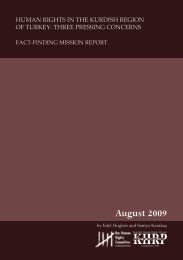FIFTH INTERNATIONAL CONFERENCE ON THE EU TURKEY AND THE KURDS
fifth international conference on the eu, turkey and the kurds
fifth international conference on the eu, turkey and the kurds
You also want an ePaper? Increase the reach of your titles
YUMPU automatically turns print PDFs into web optimized ePapers that Google loves.
<strong>FIFTH</strong> <strong>INTERNATI<strong>ON</strong>AL</strong> <strong>C<strong>ON</strong>FERENCE</strong> <strong>ON</strong> <strong>THE</strong> <strong>EU</strong>, <strong>TURKEY</strong> <strong>AND</strong> <strong>THE</strong> <strong>KURDS</strong><br />
open accession negotiations, there was a marked increase in human rights violations<br />
in Diyarbakır and the surrounding provinces. 185<br />
Honour killings where the woman was seen to have transgressed her customary, socially<br />
defined role continue to occur with a culture of impunity protecting the murderers.<br />
In June 2006, the Diyarbakır Bar Association’s Women’s Rights Centre stated<br />
that honour killings had claimed the lives of 50 women in the past six years in the<br />
south-east region of Turkey.<br />
In the sphere of women’s rights the 2006 Penal Code contained some more positive<br />
developments, particularly given the deeply chauvinistic nature of the 2003<br />
draft which criminalised adultery and did not adequately punish honour killings.<br />
Characterisations of offences committed against women based on patriarchal notions<br />
of chastity, ‘honour’ and shame have been replaced with definitions based on<br />
international human rights norms and recognition of women’s bodily integrity and<br />
sexual rights. Sexual crimes were denoted as crimes against the individual rather than<br />
crimes against society, marital rape was criminalised and rape was no longer legitimised<br />
where the perpetrator married the victim. These changes came about following<br />
a constructive and sustained campaign by women’s rights groups in Turkey to<br />
incorporate a gender perspective into criminal law, which was much to the credit of<br />
the burgeoning Turkish women’s movement.<br />
However, the 2006 code continued to refer to ‘custom killings’ rather than honour<br />
killings. It remains unclear whether this term covers all murders committed according<br />
to ‘honour’ codes and still allows the potential for legal justification for those<br />
committed in the name of honour. In addition, ‘genital examinations’ could be carried<br />
out if necessary for public health or, at the behest of a court, if required for the<br />
investigation of a crime. No requirement that the woman’s consent must first be attained<br />
had been stipulated. These highly invasive and discriminatory examinations<br />
have been used as a means of controlling female sexual relations, because pre-marital<br />
virginity is customarily seen as critical to a woman’s ‘honour’.<br />
The Commission’s 2008 Turkey Progress Report notes that the ‘legal framework guaranteeing<br />
women’s rights and gender equality is broadly in place’ 186 . However, the<br />
implication of the report is that this is yet to have a transformative impact on the<br />
position of women within Turkish society.<br />
The government of Turkey does appear to have been trying to address the problem of<br />
the implementation gap between the legal status of women and their actual position.<br />
185 Diyarbakır branch of the Human Rights Association (İHD) Report, 2005.<br />
186 European Commission 2008 Progress Report, 5 November 2008, SEC (2008) 2699, p.21<br />
186





